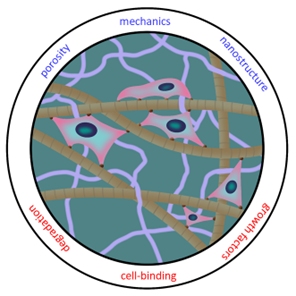PhD position (4 years)
Tissue-mimicking biopolymer networks based on recombinant structural proteins
Gijsje Koenderink lab, Bionanoscience Department of TU Delft, the Netherlands
Research aim: We are looking for a PhD student who is enthusiastic to explore tissue-mimicking biomaterials based on recombinant structural proteins. Biomaterials are widely used as scaffolds for cell culture in regenerative medicine, organ-on-chip human disease models, and cell-based meat production. However, they are currently mostly based on structural proteins sourced from animal tissues. Animal-derived products are unsustainable and raise ethical, cultural and safety concerns. Moreover, natural proteins are difficult to customize. The goal of this project is to develop protein-based biomaterials that are based on recombinant structural proteins produced by yeast cells. We thus aim to achieve sustainable production of customizable structural proteins to be used as building blocks for advanced biomaterials capable of guiding cell functions by emulating the extracellular matrix of tissues. To reach this goal, we have formed a unique multidisciplinary team. The Daran lab at TU Delft will establish a dedicated microbial cell factory to produce collagen and elastin, the main structural proteins in tissues, at high yield, while the Koenderink lab at TU Delft will use those proteins to design composite biopolymer networks with tissue-mimicking biomechanical properties. In close collaboration with the companies DSM, Meatable and VIVOLTA, we will explore applications of these materials for soft tissue repair and cell-based meat.
Job description: Your role in this project will be to develop tissue-mimicking biopolymer networks using the recombinant proteins as building blocks. Connective tissues such as skin and arteries are fascinating materials because they combine a superior mechanical strength with the ability to adapt and self-mend. One of our long-term goals is to understand the molecular basis of this paradoxical combination of strength and dynamics. Connective tissues are mechanically supported by an extracellular matrix made up of different protein polymers with complementary properties. You will focus on the two main biopolymers: collagen, which forms stiff fibres that provide tissues with tensile strength, and elastin, which confers extensibility. Together, collagen and elastin tailor the mechanical performance of each tissue in accordance with its function. Your goal will be to develop composite collagen-elastin materials with synergistic biomechanical properties. You will first develop a method for high-throughput screening of the structure and rheology of the recombinant proteins based on light scattering and optical microrheology. You will then use an integrative materials testing approach to characterize the structure and mechanics of the new materials across all scales, from molecule-to-material. This will involve the use of atomic force microscopy, electron microscopy, confocal imaging, and macroscopic mechanical testing. For collagen we will focus on the role of its post-translational modifications, while for elastin we will focus on the role of amino acid sequence on gelation temperature and final stiffness. Finally you will map the phase space of accessible mechanical behaviors that can be achieved in composites, varying the protein composition and molecular design. Your findings will provide fundamental insights in tissue biophysics and a strong basis for rational design of biomaterials for applications in soft tissue repair and cell-based meat.
The research environment: The Koenderink lab is an experimental research group centered around the soft matter physics of living matter. We combine concepts and methods from soft matter physics, biophysics, synthetic biology and mechanobiology to understand cell and tissue mechanics. We translate the design principles we discover by our fundamental research into new design concepts for nutritional and biomedical materials and approaches to diagnose or treat human diseases. Our lab is embedded in the Bionanoscience Department, which focuses on the fundamental understanding of biological processes from molecule to cell. Our group and the department as a whole feature an inspiring and supportive international environment with access to state-of-the art facilities for microfluidics and nanofabrication, advanced imaging, molecular/cell biology, biochemistry, high-performance computing for image processing, and mechanical characterization.
Your profile: We seek a talented and enthusiastic student with a strong affinity for experimental research at the interface of physics and biology. You should ideally have relevant experience in soft matter physics, biophysics, physical chemistry, bioengineering, or related fields. We are looking for a candidate with a high level of intellectual creativity and curiosity, who enjoys teamwork and easily communicates with scientists from different disciplines. Start date should be October 1st or later; the position is for 4 years.
Applicants must
- hold a Master’s degree, or approach its completion, in physics, chemistry, bioengineering, materials science, or a closely related discipline;
- have excellent written and spoken English skills;
- thrive in an international, multidisciplinary, and highly collaborative environment.
To apply: If you have any questions or wish to submit an application, please contact me at g.h.koenderink[at]tudelft.nl. Your application will be reviewed as soon as it is received. Together with your application, please send the following documents:
- A cover letter that briefly describes your research experience, research interests, why you apply for this position, and how you see yourself fit to the group.
- Curriculum vitae.
- Names and contact details from at least 2 references who can be contacted for further information.
Website: tudelft.nl/koenderinklab
Twitter: @BiosoftLab
